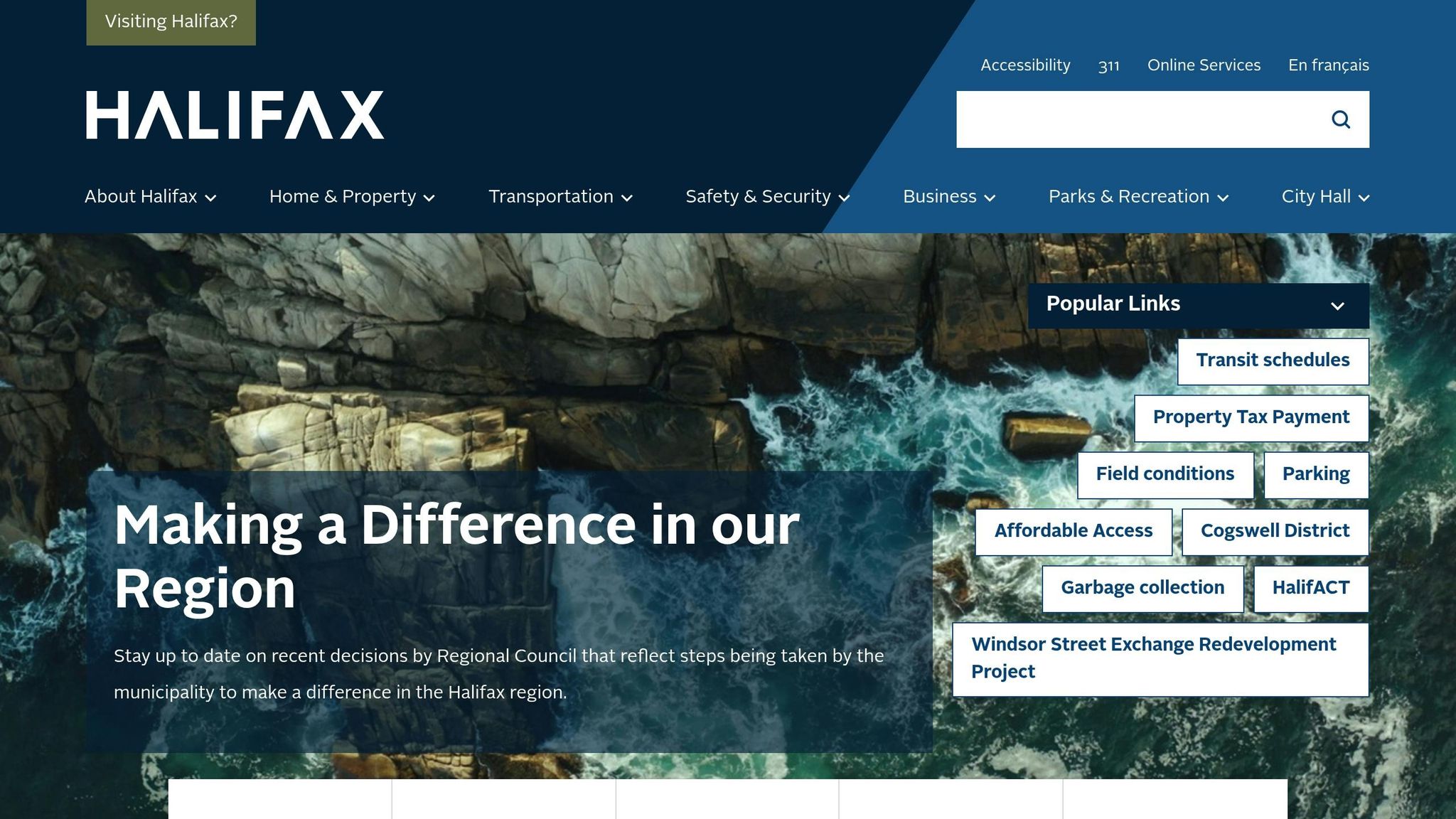Nova Scotia's short-term rental (STR) regulations have changed significantly since the STR Registration Act (STRRA) was introduced on September 30, 2024. These rules aim to address the province's housing shortage while creating clear standards for STR operators. Here's what you need to know:
- Mandatory Registration: All STR properties must register with the Tourist Accommodations Registry and meet both provincial and municipal requirements.
- Key Deadlines: Registration renewals are due annually, with the next renewal deadline on April 1, 2025.
- Compliance Rules: Operators must meet zoning, safety, and inspection standards, including displaying valid registration numbers on all STR listings.
- Fees: Registration fees vary by property type and location, from $50 for primary residences to $2,000 for commercial STRs in high-demand areas like Halifax.
- Penalties: Failing to register or comply with regulations can lead to fines, suspension, or revocation of your STR licence.
To stay compliant, ensure your property meets all zoning and safety requirements, keep your registration up to date, and monitor local bylaw changes. For those overwhelmed by the process, professional STR management services can help handle compliance and operations.
Nova Scotia's New STR Regulations: What Hosts Need to Know by September 30th!
Provincial Licensing and Registration Requirements
If you're planning to operate a short-term rental (STR) in Nova Scotia, it's important to meet the requirements set out by the STR Registration Act, which aims to protect long-term housing availability. Here's a quick guide to navigating the provincial licensing and registration process.
Before you begin operating, you must register your STR with Nova Scotia's Tourist Accommodations Registry. This process has two key steps: provincial registration, where you confirm safety and operational standards, and municipal approval, which ensures your property complies with local zoning regulations.
Keep in mind that registration fees vary based on your property type and location. Check the latest fee schedule on the registry's website to avoid surprises. Now, let’s look at how to get your STR registered.
How to Register an STR in Nova Scotia
- Create an Account: Start by signing up on the Tourist Accommodations Registry. You'll need to provide details about your property, such as the civic address and a description of the rental.
- Submit Required Documents: Upload documents that prove property ownership or your authority to operate the rental. You'll also need to show compliance with municipal land-use regulations and safety standards, such as fire safety measures, adherence to building codes, and accessibility requirements.
- Check Zoning Compliance: Verify that your property is zoned for STR use by reviewing your local municipality's guidelines.
- Property Inspection: Ensure your property meets basic safety standards. This includes having working smoke detectors, carbon monoxide detectors, and accessible emergency exits. Additional upgrades may be required depending on your property.
- Additional Business Registration (if applicable): If you're managing multiple properties or operating as a formal business, you may need to meet further registration requirements.
Once all the documentation is reviewed and approved, you'll receive final approval to operate. Processing times can vary, so it's best to apply well in advance. After you're registered, remember to stay compliant by renewing annually and updating your details as needed.
Annual Renewal and Penalties
To keep your registration active, you'll need to renew it every year. This involves updating your documentation and confirming continued compliance with all requirements. If there have been changes to your property, additional inspections might be necessary.
Be aware that late renewals come with escalating fines, and repeated violations can lead to more severe penalties. Authorities regularly monitor compliance and investigate complaints, so it's a good idea to address any issues promptly to avoid complications.
Municipal Zoning and Compliance Rules
Municipal zoning bylaws play a key role in deciding where short-term rentals (STRs) can operate. These rules differ by location and can impact factors like property type, parking availability, and safety standards. It’s a smart move to connect with your local municipal office early on to find out if you need extra permits or inspections. Below, we break down some key guidelines for both urban and rural areas.
Halifax Regional Municipality (HRM) Guidelines

The Halifax Regional Municipality (HRM) has specific rules for STR operations, making a clear distinction between primary residences and other types of properties. To ensure your property qualifies, take the time to review local regulations. Requirements might include obtaining a special permit, adhering to notification procedures, or meeting safety and parking standards. For the most accurate and up-to-date information, reach out directly to HRM.
Rural and Unzoned Areas
In rural parts of Nova Scotia, zoning rules are often simpler, but compliance doesn’t stop there. Property owners still need to meet provincial safety standards and may require business licences or extra inspections, especially for properties without municipal services. Be sure to check local bylaws covering fire safety, septic system capacity, and parking to ensure full compliance.
sbb-itb-b5e1074
Fee Structure, Fines, and Compliance Monitoring
Nova Scotia’s fee structure for short-term rentals (STRs) is tailored to property type and location, with strict enforcement measures in place to ensure operators comply with regulations.
Registration Fees by Property Type
The province’s registration fees vary depending on the type of property and its impact on local communities. Primary residence rentals incur the lowest fees, while commercial properties in high-demand areas are charged significantly more.
| Property Type | Annual Fee | Additional Requirements |
|---|---|---|
| Primary residence short-term rental | $50.00 | Zoning Confirmation Letter ($200) |
| Commercial STR - Tier 1 (Halifax, Dartmouth, Bedford, etc.) | $2,000.00 | Development Only Permit ($250) |
| Commercial STR - Tier 2 (most other communities) | $500.00 | Development Only Permit ($250) |
| Commercial STR - Tier 3 (select smaller towns) | $240.00 | Development Only Permit ($250) |
| Traditional tourist accommodation (1-4 bedrooms) | $50.00 | Varies by municipality |
| Traditional tourist accommodation (5+ bedrooms) | $150.00 | Varies by municipality |
For properties in Nova Scotia’s most populated areas, such as Halifax, Dartmouth, and Bedford, the Tier 1 commercial fee of $2,000 reflects the province’s effort to manage housing availability in regions with high demand. In contrast, Tier 3 communities, such as Clark’s Harbour, Digby, Lockeport, Mulgrave, and Shelburne, pay just $240 annually. This lower rate is designed to encourage tourism in smaller towns.
Compliance Monitoring and Enforcement
Nova Scotia takes a proactive approach to monitoring compliance, relying on technology, partnerships, and public reporting to identify operators who fail to follow regulations. A key element of this strategy is the requirement for mandatory registration numbers on all online advertisements and platform listings.
Starting September 30, 2024, platform operators, including major booking sites, must display valid registration numbers for all STR listings. Hotel and motel accommodations are the only exceptions [3]. The government has also established data-sharing agreements with these platforms, enabling the Minister to request transaction records and other information necessary for compliance [3]. Additionally, municipal partnerships and public reporting mechanisms empower residents to report non-compliant operators directly to authorities [2].
Non-compliance comes with steep penalties. Operating without a valid registration or failing to meet registration requirements is considered an offence, subject to financial penalties [3][1]. The Minister has the authority to deny, cancel, revoke, or suspend registrations for violations [3]. Furthermore, information-sharing provisions allow the Minister to share registration data with municipalities and other governments under specific agreements [3].
This comprehensive framework ensures that Nova Scotia’s STR regulations are enforced effectively, balancing provincial goals with local needs for fair and compliant operations.
Best Practices and Market Insights
Navigating Nova Scotia's short-term rental (STR) regulations successfully requires a thoughtful approach. By following registration and municipal guidelines, staying informed, and planning strategically, property owners can better handle challenges and remain profitable in this evolving market.
Compliance Tips for STR Owners
To stay on top of Nova Scotia’s regulatory requirements, here are some practical strategies for STR operators:
- Keep a detailed calendar for key dates. Track deadlines for renewals, tax payments, and inspections. Maintain thorough records of guest interactions, property maintenance, and financial transactions. Also, save digital copies of essential documents like your registration certificate, zoning confirmation letters, and any municipal correspondence. These may be required during compliance reviews.
- Ensure online listings are accurate. Double-check that your registration number is correctly displayed on all platforms. Even small errors could lead to your listing being flagged as non-compliant.
- Stay updated on local regulations. Guidelines can change frequently, especially in areas like Halifax Regional Municipality. Smaller or rural communities may also introduce zoning changes with little notice. Subscribing to municipal newsletters or attending local council meetings can help you stay informed.
- Build good relationships with neighbours. Many compliance issues arise from complaints about noise, parking, or property upkeep. Address concerns proactively by setting clear house rules for guests, ensuring proper parking arrangements, and keeping your property well-maintained.
Market Trends and Seasonal Performance
Nova Scotia’s STR market follows clear seasonal trends. The summer months - June through September - tend to bring the highest occupancy rates and daily rates, especially in popular tourist areas.
During the off-season, performance can vary widely. Rentals of primary residences often see steadier margins, while some operators shift to mid-term rentals during the winter to attract guests needing longer stays, such as temporary workers or students.
To manage costs tied to regulations, consider adjusting pricing strategies early in the season. Incorporating these expenses into your rates from the outset can help you maintain profitability. Using dynamic pricing tools to respond to local events, weather changes, and competitor availability can also balance revenue with compliance costs.
Another trend to note: travellers are increasingly drawn to smaller communities offering authentic Maritime experiences. These areas often have fewer regulatory hurdles, presenting an opportunity for property owners to join the STR market with less administrative burden.
How Casa Scotia Supports STR Owners

Casa Scotia provides tailored services to help STR owners navigate compliance and seize market opportunities. Their comprehensive management approach takes much of the administrative load off property owners, allowing them to focus on their goals.
- Dynamic pricing tools: Casa Scotia’s pricing strategies align with seasonal demand and local conditions, helping owners maximise revenue while accounting for compliance-related costs.
- Professional staging and photography: These services ensure that listings meet platform standards and attract high-quality guests. Casa Scotia also manages the technical aspects of maintaining accurate registration numbers on booking platforms, reducing the risk of compliance issues.
- Guest screening and communication: By managing guest interactions, Casa Scotia helps prevent problems that could lead to neighbour complaints or municipal reviews.
- Owner portal for real-time updates: This feature provides insights into property performance, compliance status, and financial metrics. Monthly reports break down expenses like municipal taxes, helping owners evaluate their return on investment.
Casa Scotia offers flexible service options, including year-round management or peak-season-only support. This allows property owners to choose a plan that aligns with their goals - whether that’s maximising revenue during high-demand months or reserving the property for personal use during quieter periods.
Navigating STR Regulations in Nova Scotia
Running a short-term rental (STR) in Nova Scotia means staying on top of changing provincial and municipal regulations. Keeping your property compliant requires attention to both annual and ongoing requirements.
Provincial registration renewal is a critical yearly task. Make sure to renew your registration by April 1 each year. If there are any changes to your registration details, you must inform the Minister within 10 days to keep records up to date. At the same time, don’t overlook local rules - these need to be met alongside provincial obligations.
In the Halifax Regional Municipality (HRM) and other areas, land-use by-laws and safety standards are frequently updated. To avoid surprises, regularly check the HRM website and the Nova Scotia "Register your Tourist Accommodation" page for updates on zoning and safety requirements.
Beyond registration, staying informed about official communications is essential. The Minister is responsible for notifying registrants of any changes to registration terms and conditions. Keeping a close eye on these notifications can help you avoid penalties or operational disruptions.
Failing to comply with regulations can lead to fines, or worse, suspension or revocation of your STR registration. To prepare for possible regulatory reviews, maintain well-organized documentation, such as safety equipment certifications and any official notifications you receive.
For property owners who find these requirements overwhelming, professional STR management services can be a game-changer. Companies like Casa Scotia help simplify compliance by tracking regulatory updates, ensuring your registration details are accurate across listing platforms, and keeping you informed about both provincial and municipal rules. Their owner portal even offers real-time compliance updates, so you can focus on other aspects of your rental business.
Treat compliance as a continuous priority rather than a one-time task. By scheduling regular reviews of regulations and building connections with local officials, you can create a sustainable and successful STR operation in Nova Scotia’s ever-changing regulatory environment.
FAQs
What happens if I don’t renew my short-term rental registration by April 1 in Nova Scotia?
Missing the April 1 deadline to renew your short-term rental (STR) registration can have serious repercussions. You could be hit with fines, face restrictions on your operations, or even be forced to suspend your rental activities altogether.
To keep things running smoothly, make sure to renew your registration on time and meet all legal requirements. Staying ahead of deadlines not only safeguards your business but also keeps you aligned with local regulations.
What steps do I need to take to ensure my short-term rental meets provincial and municipal zoning rules in Nova Scotia?
To operate a short-term rental in Nova Scotia, you’ll need to register with the Tourist Accommodations Registry and ensure your property meets local municipal by-laws. This often means obtaining essential documents like a zoning confirmation letter or a development permit from your local government.
It's important to carefully review both provincial and municipal requirements since zoning rules can differ depending on the location. Keeping track of any regulatory updates can help you avoid potential fines or interruptions in your rental business.
How can I stay compliant with Nova Scotia's new short-term rental (STR) regulations if I'm feeling overwhelmed?
To comply with Nova Scotia's updated short-term rental (STR) regulations, the first step is to register your property before starting operations. Keep in mind that each rental location requires its own separate registration. Also, don’t forget to renew your registration every year by April 1 - having all necessary documents ready ahead of time can make this process smoother.
It’s equally important to confirm with your local municipality if you need any permits or zoning approvals for your property. Once your registration is complete, ensure your registration number is clearly displayed on all your listings. Following these steps will help you stay on top of legal requirements and run your rental smoothly.
Related Blog Posts
- Short term rental regulation in HRM ( Halifax, Bedford, Dartmouth )
- Short-Term Rental Regulations in Nova Scotia: Annapolis Valley (Wolfville, Kentville, Annapolis Royal)
- Short-Term Rental Regulations in Nova Scotia: Eastern Shore (Sheet Harbour, Guysborough, Sherbrooke)
- Short-Term Rental Regulations in Nova Scotia: Yarmouth & Acadian Shores (Yarmouth, Clare, Digby)



